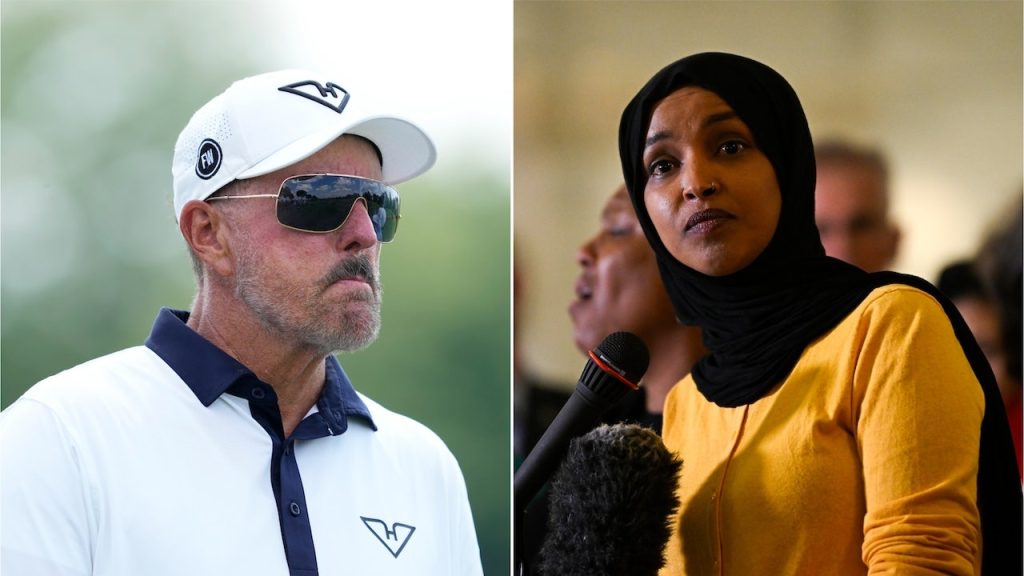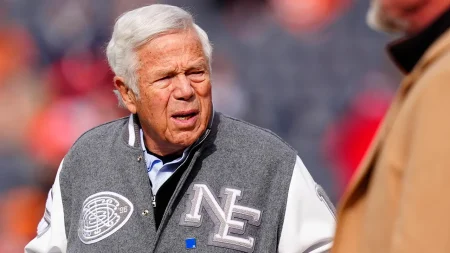Ilhan Omar’s Controversial Remarks About Charlie Kirk Spark Backlash
In the aftermath of Charlie Kirk’s tragic assassination in Utah, a heated exchange has developed between Congresswoman Ilhan Omar (D-Minn.) and golf legend Phil Mickelson, highlighting the deep political divisions that continue to plague American discourse. During a recent CNN interview, Omar doubled down on her previous social media posts in which she had referred to Kirk as “Dr. Frankenstein.” She expressed bewilderment at those seeking to honor Kirk’s memory, stating, “What I find jarring is that there’s so many people willing to excuse the most reprehensible things that he said… I am not going to sit here and be judged for not wanting to honor any legacy this man has left behind, that should be in the dustbin of history.” These comments came after Omar had already faced criticism for an interview with progressive outlet Zeteo, where she criticized Kirk’s past commentary on racial issues, particularly his stance on Juneteenth. While Omar later clarified that her “heart breaks for his wife and children” and that she doesn’t “wish violence on anyone,” her initial remarks were perceived by many as insensitive in the wake of Kirk’s death.
The controversy escalated when Phil Mickelson responded forcefully to Omar’s comments on X (formerly Twitter), writing that “Ilhan spews hate every time she opens her mouth, she came here fraudulently and will hopefully be sent back to Somalia soon.” Mickelson’s post received considerable support from his followers, reflecting his outward support for Kirk in the days following the assassination. The golf star had previously posted that Kirk’s death was “bringing out some of the best in humanity and it’s also exposing some of the worst,” praising the “unification, love, support, and outcry on his behalf throughout the world” while condemning those who supported the assassin’s actions. Mickelson’s strong rebuke of Omar represents just one voice in the growing chorus of criticism directed at the congresswoman from conservative figures and organizations following her comments about Kirk.
The fallout from Omar’s remarks has extended beyond social media into the halls of Congress, where Republican colleagues have taken formal action against her. Representative Nancy Mace (R-S.C.) moved to force a vote on censuring Omar over her reaction to Kirk’s killing, though the motion was ultimately tabled when four Republicans joined Democrats in opposition. More recently, House Main Street Caucus Chairman Mike Flood (R-Neb.) announced plans to refer Omar for a House Ethics Committee investigation, citing her “obnoxious, insulting and dismissive comments following the assassination of Charlie Kirk” as the primary complaint. Flood’s referral also includes allegations that Omar hosted a workshop advising Somali immigrants on how to avoid deportation and that she improperly used TikTok for mixed official and campaign content, which would violate House rules.
Despite the mounting criticism, Omar has found support among her Democratic colleagues, who have defended her against censure and Republican attacks. The congresswoman herself has accused Republicans of taking her words out of context, describing Kirk’s death as “mortifying” and emphasizing that her faith teaches “the power of peace, empathy, and compassion.” She further claimed that “right-wing accounts” were trying to “spin a false story” despite her having “condemned his murder multiple times,” suggesting this was part of an agenda to “villainize the left” and deflect from Donald Trump’s rhetoric. Adding to the controversy, Omar reposted a video on X featuring commentators unaffiliated with her who claimed that people expressing outrage over Kirk’s death were “using his death to further their Christo-fascist agenda.”
This heated exchange between Omar and Mickelson epitomizes the deeply polarized state of American political discourse, where even tragic events like assassinations become flashpoints for partisan conflict. Kirk, a conservative influencer with a significant following, had been a controversial figure in his own right, with detractors criticizing his comments on race, slavery, and other social issues. His assassination has now become not just a personal tragedy for his family and friends but a symbolic event interpreted differently across the political spectrum. For supporters like Mickelson, Kirk represents a victim whose memory should be honored, while critics like Omar see a more complex legacy that they feel should not be whitewashed in death.
The controversy surrounding Omar’s comments and Mickelson’s response highlights several troubling aspects of contemporary American politics: the immediate politicization of tragedy, the harsh personal attacks that have become commonplace in public discourse, and the inability to find common ground even in condemning political violence. As the investigation into Kirk’s assassination continues and the debate over his legacy persists, this incident serves as a sobering reminder of how deeply entrenched political divisions have become in American society. The scrutiny over security lapses surrounding Kirk’s shooting and the political aftermath demonstrate that even in moments that should unite Americans in opposition to political violence, finding unity remains elusive in today’s fractured political landscape.














